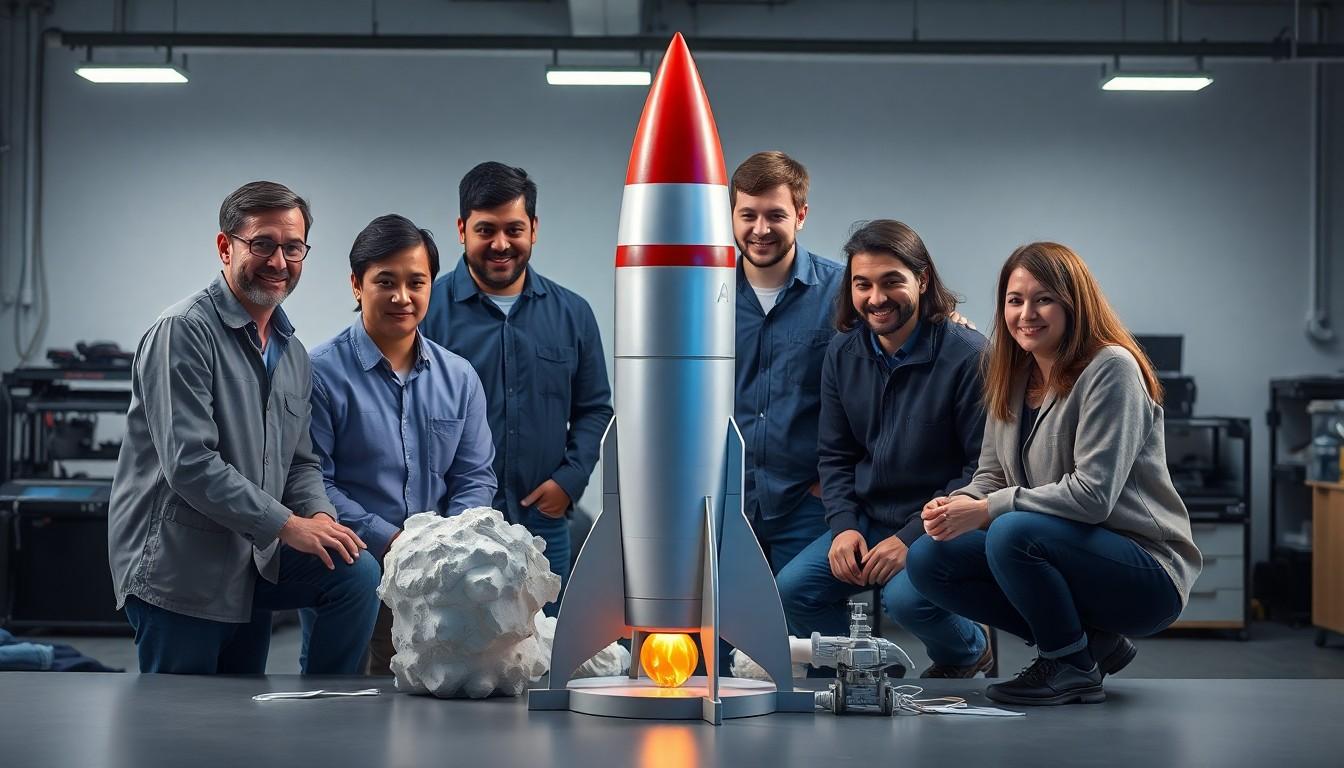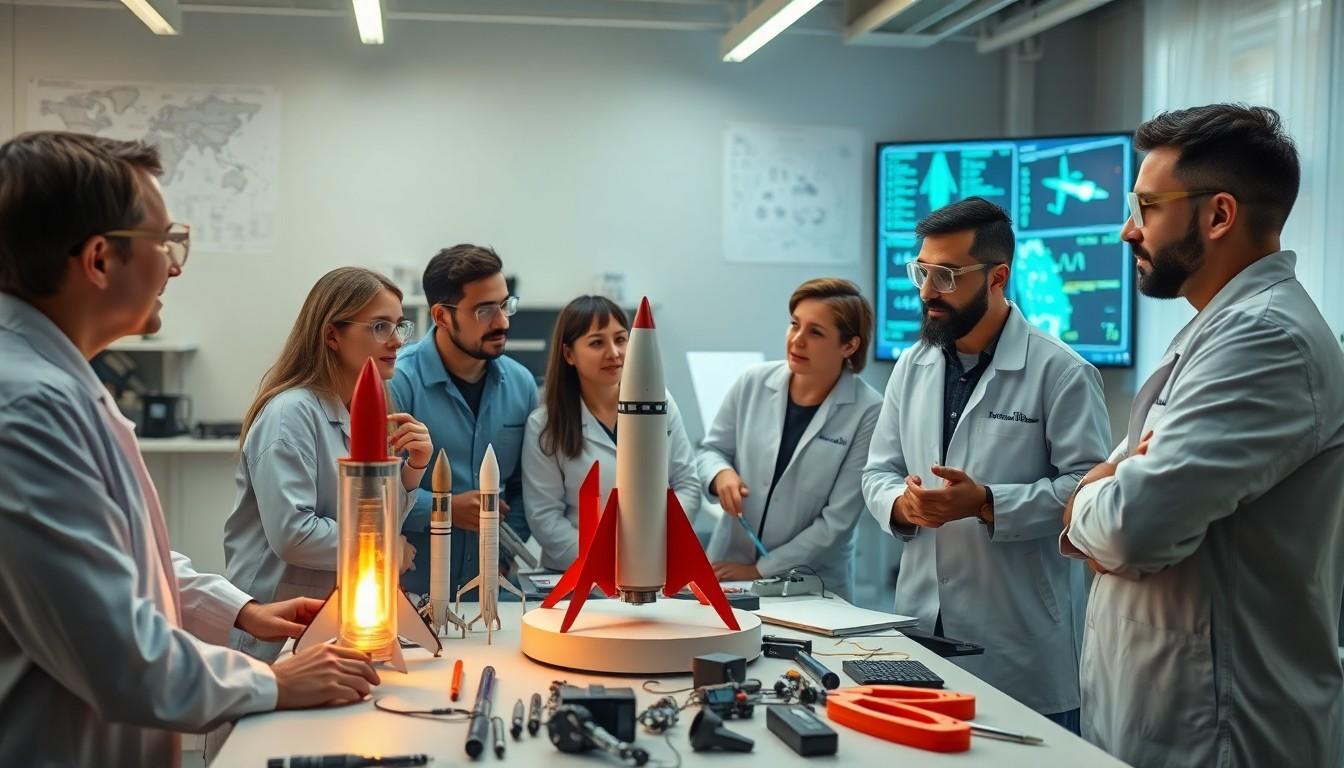In an era where rockets are more than just childhood dreams, aerospace startups are soaring to new heights. These innovative companies are redefining the skies, proving that with a bit of creativity and a whole lot of caffeine, the stars aren’t just for astronauts anymore. Who knew that the next big leap for mankind could come from a garage rather than a government facility?
Aerospace Startups
Aerospace startups represent a dynamic force in modern space exploration. These companies focus on groundbreaking innovations that challenge traditional aerospace paradigms. Numerous startups prioritize affordability by leveraging new technologies and materials to reduce costs associated with launches.
Some emerging players specialize in satellite technology, improving communication and data collection across different sectors. Others concentrate on developing reusable launch systems, significantly enhancing efficiency in space travel. Opportunities abound for startups aiming to create sustainable solutions, such as in-space manufacturing and space tourism.
Investors increasingly recognize the potential of aerospace startups, leading to a surge in funding. Industry reports indicate that venture capital investments in aerospace startups reached over $4 billion in 2022, reflecting this growing interest. Collaborative efforts among startups, private firms, and government agencies drive rapid innovation, ensuring a robust future for the industry.
Several incubators and accelerators support these startups, providing essential resources and mentorship. Networking opportunities among innovators foster synergy and shared knowledge. Various challenges, such as regulatory hurdles and technical complexities, continue to shape the landscape but also motivate startups to find innovative solutions.
Furthermore, the global demand for satellite services and exploration initiatives influences the growth of these companies. With increasing public interest in space, the market for aerospace startups shows immense promise. Investors are focusing on aircraft advancements, satellite technology, and space transport, ensuring a diverse landscape for new entrants.
Key Players in the Industry

A variety of companies shape the landscape of aerospace startups. Innovation and strategic vision define their roles in advancing technologies.
Notable Aerospace Startups
Relativity Space focuses on 3D printing rockets, aiming to streamline production processes. Rocket Lab, known for its Electron rocket, specializes in small satellite launches, enhancing accessibility for various industries. Astra develops small launch vehicles, contributing to the growing demand for lower-cost orbital access. Another prominent player, SpaceX, continues to revolutionize space transport with its reusable Falcon 9 rockets while pursuing interplanetary travel through the Starship program. These startups exemplify the shift towards more agile and efficient approaches in aerospace exploration.
Established Companies Entering the Market
Major corporations like Boeing and Lockheed Martin show increased interest in startup ventures, acknowledging the potential for innovation. Boeing’s investments in startups aim to refine satellite technology and commercial space endeavors. Likewise, Lockheed Martin actively engages in partnerships with emerging firms to enhance their capabilities in areas like in-space manufacturing and space tourism. Northrop Grumman also explores collaborations, targeting advancements in satellite systems and launch services. Traditional aerospace leaders recognize that these partnerships can drive new growth and innovation in a rapidly evolving market.
Innovations and Technologies
Aerospace startups are driving advancements across various fields. Startups leverage novel strategies to reshape traditional aerospace paradigms through innovative technologies.
Breakthroughs in Aerospace Engineering
New materials and manufacturing techniques are facilitating breakthroughs in aerospace engineering. For example, 3D printing has revolutionized rocket production by reducing time and costs associated with complex components. Lightweight composites offer improved strength and durability, enhancing overall vehicle performance. Various startups focus on reimagining propulsion systems aimed at boosting efficiency and reducing environmental impact. Achieving lower launch costs directly impacts accessibility to space, broadening opportunities for future exploration and research initiatives.
The Role of AI and Automation
Artificial intelligence and automation play critical roles in modern aerospace innovations. Startups utilize AI for optimizing flight paths and enhancing real-time decision-making during missions. Data analysis becomes more efficient with machine learning algorithms, allowing predictive maintenance to improve reliability. Robotic systems increasingly automate manufacturing processes, leading to faster production cycles and reduced human error. Integration of these technologies enables startups to address complexities while efficiently managing resources in a competitive environment.
Challenges Faced by Aerospace Startups
Aerospace startups encounter several critical challenges that can hinder their growth and innovation. Understanding these obstacles highlights the complexities of entering this rapidly evolving industry.
Funding and Investment Issues
Funding poses a significant challenge for aerospace startups. Many struggle to secure the necessary capital to develop cutting-edge technologies and bring products to market. Venture capital investments surpassing $4 billion in 2022 reflect growing interest, yet competition for funding remains fierce. Startups often compete against established entities, complicating the fundraising landscape. Limited access to traditional financing can also stifle growth and innovation. Creative funding solutions like crowdfunding or partnerships may alleviate financial constraints, yet they require strategic planning and execution.
Regulatory Hurdles
Regulatory hurdles represent another formidable obstacle. Startups must navigate a maze of regulations that govern aerospace operations, which often varies by country. Compliance with safety standards and obtaining necessary licenses can delay projects, diverting resources and attention from innovation. Additionally, extensive testing requirements for new technologies and vehicles may prolong development timelines. Engaging with agencies like the FAA or NASA often becomes essential but requires time-consuming processes. Staying informed about changing regulations is vital for startups to adapt quickly and maintain competitive advantages.
Future of Aerospace Startups
The aerospace startup landscape continues to evolve through innovation and emerging technologies. Investment trends and market demands shape the future, with several key aspects driving growth.
Trends Shaping the Industry
Innovation in satellite technology stands out as a leading trend. Startups increasingly focus on small satellites for better communication and data transmission. Additionally, developments in reusable launch systems are gaining momentum, significantly lowering launch costs. Sustainable solutions, including in-space manufacturing and green propulsion technologies, are becoming priorities as the industry addresses environmental concerns. Collaborations among startups, established companies, and government agencies ignite rapid development, facilitating market entry and innovation. The rise of artificial intelligence also plays a crucial role in optimizing operations and enhancing efficiency across various platforms.
Predictions for Growth and Development
Analysts project significant growth in the aerospace sector, with venture capital investments likely to exceed $5 billion by 2024. An increasing demand for satellite services and advancements in space tourism contribute to this expansion. Startups focusing on innovative technologies are expected to capture larger market shares as competition intensifies. The global space economy is estimated to reach $1 trillion by 2040, offering lucrative opportunities for new entrants. Emphasis on sustainability will drive development, encouraging startups to adopt eco-friendly practices. Government support, combined with private investment, enhances the potential for groundbreaking discoveries in space exploration and utilization.
Space Exploration and Technology
Aerospace startups are redefining the landscape of space exploration and technology. Their innovative approaches and commitment to affordability are paving the way for a new era in the aerospace sector. As these companies continue to tackle challenges and push boundaries, they’re not just competing with established players but also collaborating to drive significant advancements.
The future holds immense promise as investments pour into this dynamic field. With the global space economy projected to reach $1 trillion by 2040, startups focusing on sustainable solutions and cutting-edge technologies will play a crucial role in shaping the next chapter of space exploration. The journey ahead is filled with opportunities for growth and innovation, making it an exciting time for aerospace enthusiasts and investors alike.

